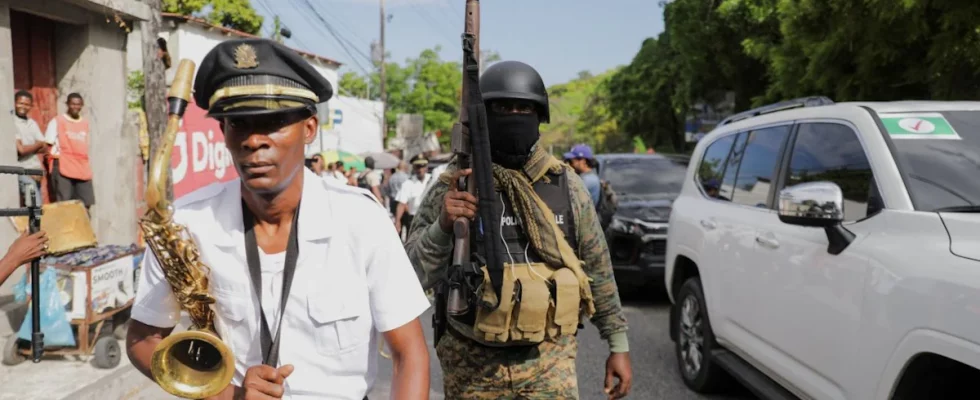Gunshots echoed through Port-au-Prince as Haiti’s new interim government was sworn in on Thursday. The act had actually been planned to be carried out in the National Palace, located in the center. For security reasons, those attending the ceremony moved to the Prime Minister’s residence, the Villa d’Accueil, in the east of the capital.
The new interim leadership has nine members. They belong to various parties, as well as representatives of civil society, the private sector, a pastor and a former World Bank employee, but the latter has no voting rights. Prime Minister will be Michel Patrick Boisvert, the finance minister of the previous interim president Ariel Henry.
Since the murder of the head of state in 2021, the country no longer has an elected government
He had already declared his resignation in a letter from Los Angeles: Since a trip to Kenya at the end of February, the politician had not been able to return to his homeland because of the escalating violence in Haiti. “We have served our nation in difficult times,” Henry wrote in his resignation statement. The big question now is whether these will get much better with the new transitional government.
She has immense tasks ahead of her. Firstly, there are the elections: the last ones took place in Haiti in 2016. Since then-President Jovenel Moïse was assassinated in 2021, under circumstances that are still not fully understood, the country no longer has a properly elected head of state. The terms of office of all other representatives of the people have long since expired, from representatives to mayors. In short: a ballot is urgently needed, but at the same time it is difficult to organize in Haiti, a nation that is sinking ever deeper into chaos.
Gangs now control large parts of the capital Port-au-Prince, as well as important highways and access to airports and seaports. The gangs loot shops and extort protection money, even police stations are set on fire and women and girls are systematically raped. According to a United Nations report, more than 2,500 people were killed or injured from January to March alone, twice as many as in the same period last year.
Exodus from Port-au-Prince
Embassies, including that of Germany, have long since withdrawn their staff and tens of thousands of women, men and children have fled the capital Port-au-Prince in recent months. They now live in makeshift camps, often under catastrophic conditions, as aid organizations report. Almost half of the population is hungry or does not know how to feed themselves. At the same time, getting supplies into the country is becoming increasingly difficult, important ports are blocked due to the violence, and air traffic is severely affected. “Port-au-Prince is almost in total lockdown,” Catherine Russell, the director of the United Nations Children’s Fund, said earlier this week.
With the Transitional Council now sworn in, Haiti at least has an interim government again. In Washington there was talk of a “decisive step toward free and fair elections.” There is hope that the establishment of the new transitional government will also advance the plan to send a multinational police force.
“Be ready,” threatens one of the most powerful gang bosses
It should be led by Kenya: The African country agreed last year to send a total of 1,000 police officers to Haiti. In March, after a renewed outbreak of violence in the island nation and the ever-worsening political crisis, the plans were put on hold for the time being – until a new interim government is in office.
With the interim government sworn in, the way would now be clear, but what pacification of Haiti would look like in practice is completely unclear. Some of the gangs that now terrorize and control the country had demanded to be involved in the new interim government or at least to be able to take part in talks. Now that this is not the case, the gangs have announced that they will not accept the new leadership and will do everything they can to hinder the work of the interim council.
“Stand by,” threatened Jimmy Chérizier, one of the most powerful gang bosses, in a video online. And the new leadership is also partly controversial among the civilian population. It is perceived by some as a government imposed on the country from outside.
Michel Patrick Boisvert, the new interim prime minister, was nevertheless hopeful on Thursday: “Today opens up the prospect of a solution,” he explained. Afterwards, the members of the new interim government toasted their swearing in with champagne: “To Haiti!”

